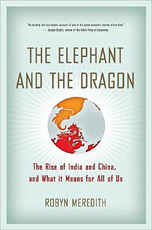Robyn Meredith is a foreign correspondent for Forbes magazine who lives in Hong Kong. She has written an eye-opening report on the meteoric rise of India and China as the fastest growing big economies on the planet. Foreign companies have poured more than $600 billion into China since 1978 and that far exceeds what the United States spent on the Marshall Plan after World War II to rebuild Europe. Tens of millions of young Chinese now travel from rural villages to factory dorms where they make clothes, digital cameras, and computers for foreigners. The country has become the factory for the world. As an example, 75 percent of all new toys were made in China in 2005.
Meanwhile in India, English speaking college graduates are taking jobs answering customer calls on 1-800 phone lines, and others are qualifying for white-collar jobs with multinational firms. Both China and India are becoming a source of employees, co-workers, customers, and competitors. At the same time, these two nations are providing the United States with gigantic markets for its products. Meredith calls all of these developments tectonic economics.
The author explains some of the changes that have propelled China the dragon and India the elephant on their path toward economic revitalization. Much has been written on offshoring, the movement of white-collar work overseas. Meredith states that this trend will continue, and as many as 300,000 American jobs will move overseas to China and India. The trade-off is that Americans will pay less money for goods and services. Meredith discusses the phenomenon of the "disassembly line," the shipping of partly finished goods from one factory to another, as companies seek the lowest-cost place to make each component of their products. "Cost-cutting efforts combined with powerful new technology allowed companies to change the way they build most consumer products."
There are some downsides to this unfolding story: the human rights violations in China, the growing air and water pollution in both countries, the gigantic gaps between the rich and the poor, and the thirst both nations have for petroleum. China, just recently became the world's second largest auto market. The Elephant and the Dragon is a fascinating read. It challenges us to take more seriously the way developments in both China and India will affect the nature and quality of our lives in years to come.
